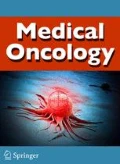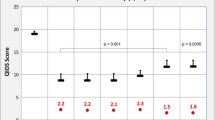Abstract
The aim of this study was to evaluate the mental health consumption among patients with early-stage breast cancer in two radiation oncology departments in two countries (USA and Italy). Data were extracted from the medical records of consecutive patients treated between 2014 and 2015 in two centers. Extracted data included patient’s demographics, treatment, referral to psychological supportive care programs, and prescribed psychotropic drugs. Data from the two centers were compared using Student’s t, Wilcoxon, Fisher’s exact, and Jonckheere–Terpstra tests. Adjusted relative risks (RR) were estimated using Poisson regression. A total of 231 (Italy = 110, USA = 121) patients were included, with a mean age of 60 years. The crude rate of psychological supportive care visits was similar in the US versus the Italian cohort (28.9 vs. 21.8%, p = 0.23). The crude rate of prescribed psychotropic drug was higher in the US cohort versus Italian cohort (43.8 vs. 18.2%, p < 0.0001). These differences remained significant after adjusting for breast cancer subtype, stage, and treatment (RR 1.8, 95 CI 1.17–2.76). Between 20 and 30% of patients receive psychological supportive care during treatment for breast cancer. The use of psychotropic medication was higher in the US cohort than the cohort from Italy. The reasons for these differences might be related to social and cultural differences and the method of prescribing medication.

Similar content being viewed by others
References
Ferlay J, Soerjomataram I, Dikshit R, Eser S, Mathers C, Rebelo M, Parkin DM, Forman D, Bray F. Cancer incidence and mortality worldwide: sources, methods and major patterns in GLOBOCAN 2012. Int J Cancer. 2015;136:E359–86.
Lengacher CA, Reich RR, Paterson CL, Ramesar S, Park JY, Alinat C, Johnson-Mallard V, Moscoso M, Budhrani-Shani P, Miladinovic B, Jacobsen PB, Cox CE, Goodman M, Kip KE. Examination of Broad Symptom Improvement Resulting From Mindfulness-Based Stress Reduction in Breast Cancer Survivors: a Randomized Controlled Trial. J Clin Oncol. 2016;34:2827–34.
Byar KL, Berger AM, Bakken SL, Cetak MA. Impact of adjuvant breast cancer chemotherapy on fatigue, other symptoms, and quality of life. Oncol Nurs Forum. 2006;33:E18–26.
Berger AM, Visovsky C, Hertzog M, Holtz S, Loberiza FR Jr. Usual and worst symptom severity and interference with function in breast cancer survivors. J Support Oncol. 2012;10:112–8.
Ganz PA, Desmond KA, Leedham B, Rowland JH, Meyerowitz BE, Belin TR. Quality of life in long-term, disease-free survivors of breast cancer: a follow-up study. J Natl Cancer Inst. 2002;94:39–49.
Menning S, de Ruiter MB, Kieffer JM, van Rentergem JA, Veltman DJ, Fruijtier A, Oldenburg HS, Boven E, van der Meij S, Lustig V, Bos ME, Boogerd W, Reneman L, Schagen SB. Cognitive impairment in a subset of breast cancer patients following systemic therapy: results from a longitudinal study. J Pain Symptom Manage. 2016;52:560–9.e1.
Alkan A, Guc ZG, Senler FC, Yavuzsen T, Onur H, Dogan M, Karci E, Yasar A, Koksoy EB, Tanriverdi O, Turhal S, Urun Y, Ozkan A, Mizrak D, Akbulut H. Breast cancer survivors suffer from persistent postmastectomy pain syndrome and posttraumatic stress disorder (ORTHUS study): a study of the palliative care working committee of the Turkish Oncology Group (TOG). Support Care Cancer. 2016;24:3747–55.
Lebel S, Tomei C, Feldstain A, Beattie S, McCallum M. Does fear of cancer recurrence predict cancer survivors’ health care use? Support Care Cancer. 2013;21:901–6.
Sarkar S, Sautier L, Schilling G, Bokemeyer C, Koch U, Mehnert A. Anxiety and fear of cancer recurrence and its association with supportive care needs and health-care service utilization in cancer patients. J Cancer Surviv. 2015;9:567–75.
http://unclineberger.org/patientcare/support/ccsp/programs_services. Accessed 17 Oct 2016.
Coyne JC, Palmer SC, Shapiro PJ, Thompson R, DeMichele A. Distress, psychiatric morbidity, and prescriptions for psychotropic medication in a breast cancer waiting room sample. Gen Hosp Psychiatry. 2004;26:121–8.
Giese-Davis J, Bliss-Isberg C, Carson K, Star P, Donaghy J, Cordova MJ, Stevens N, Wittenberg L, Batten C, Spiegel D. The effect of peer counseling on quality of life following diagnosis of breast cancer: an observational study. Psychooncology. 2006;15:1014–22.
Kowalski C, Ferencz J, Singer S, Weis I, Wesselmann S. Frequency of psycho-oncologic and social service counseling in cancer centers relative to center site and hospital characteristics: Findings from 879 center sites in Germany, Austria, Switzerland, and Italy. Cancer. 2016. doi:10.1002/cncr.30202.
Railton C, Lupichuk S, McCormick J, Zhong L, Ko JJ, Walley B, Joy AA, Giese-Davis J. Discharge to Primary Care for Survivorship Follow-Up: how Are Patients With Early-Stage Breast Cancer Faring? J Natl Compr Cancer Netw. 2015;13:762–71.
Baker F, Denniston M, Smith T, West MM. Adult cancer survivors: how are they faring? Cancer. 2005;104:2565–76.
Knobf MT. Psychosocial responses in breast cancer survivors. Semin Oncol Nurs. 2007;23:71–83.
Paulose-Ram R, Safran MA, Jonas BS, Gu Q, Orwig D. Trends in psychotropic medication use among U.S. adults. Pharmacoepidemiol Drug Saf. 2007;16:560–70.
Carta MG, Kovess V, Hardoy MC, Brugha T, Fryers T, Lehtinen V, Xavier M. Psychosocial wellbeing and psychiatric care in the European Communities: analysis of macro indicators. Soc Psychiatry Psychiatr Epidemiol. 2004;39:883–92.
Mitchell AJ, Chan M, Bhatti H, Halton M, Grassi L, Johansen C, Meader N. Prevalence of depression, anxiety, and adjustment disorder in oncological, haematological, and palliative-care settings: a meta-analysis of 94 interview-based studies. Lancet Oncol. 2011;12:160–74.
Maunsell E, Brisson J, Deschenes L. Psychological distress after initial treatment for breast cancer: a comparison of partial and total mastectomy. J Clin Epidemiol. 1989;42:765–71.
Trief PM, Donohue-Smith M. Counseling needs of women with breast cancer: what the women tell us. J Psychosoc Nurs Ment Health Serv. 1996;34:24–9.
Maunsell E, Brisson J, Deschenes L. Psychological distress after initial treatment of breast cancer. Assessment of potential risk factors, Cancer. 1992;70:120–5.
Giese-Davis J, Bliss-Isberg C, Wittenberg L, White J, Star P, Zhong L, Cordova MJ, Houston D, Spiegel D. Peer-counseling for women newly diagnosed with breast cancer: a randomized community/research collaboration trial. Cancer. 2016;122:2408–17.
Schellekens MP, Tamagawa R, Labelle LE, Speca M, Stephen J, Drysdale E, Sample S, Pickering B, Dirkse D, Savage LL, Carlson LE. Mindfulness-Based Cancer Recovery (MBCR) versus Supportive Expressive Group Therapy (SET) for distressed breast cancer survivors: evaluating mindfulness and social support as mediators. J Behav Med. 2016;40:414.
Kokavec A. Community based psychosocial education can improve mood disturbance in breast cancer survivors at various stages of their recovery. Behav Cogn Psychother. 2016;44:730–6.
Merckaert I, Lewis F, Delevallez F, Herman S, Caillier M, Delvaux N, Libert Y, Liénard A, Nogaret JM, Ogez D, Scalliet P, Slachmuylder JL, Van Houtte P, Razavi D. Improving anxiety regulation in patients with breast cancer at the beginning of the survivorship period: A randomized clinical trial comparing the benefits of single-component and multi-component group interventions. Psychooncology. 2016. doi:10.1002/pon.4294.
Maheu C, Lebel S, Courbasson C, Lefebvre M, Singh M, Bernstein LJ, Muraca L, Benea A, Jolicoeur L, Harris C, Ramanakumar AV, Ferguson S, Sidani S. Protocol of a randomized controlled trial of the fear of recurrence therapy (FORT) intervention for women with breast or gynecological cancer. BMC Cancer. 2016;16:291.
Acknowledgements
We thank Silvia Fabiani and Nicoletta Sclafani, case managers responsible for local CORD at FUH; Silvio Fiorenzoni, MD, and Leonardo Fei, MD, psychiatrists responsible for the supportive care at FUH. We thank Justin Yopp, Ph.D., Elizabeth Sherwood, RN, MS, Mimi Alvarez, RN, MSN, PMHCNS-BC, Pamela Durham, MS, Don Rosenstein, MD, responsible for the supportive care program at UNC.
Author information
Authors and Affiliations
Corresponding author
Ethics declarations
Conflict of interest
The authors declare that they have no conflict of interest.
Ethical approval
This article does not contain any studies with human participants or animals performed by any of the authors. The study was approved by the institutional ethic review boards at both centers.
Rights and permissions
About this article
Cite this article
Kaidar-Person, O., Meattini, I., Deal, A.M. et al. The use of psychological supportive care services and psychotropic drugs in patients with early-stage breast cancer: a comparison between two institutions on two continents. Med Oncol 34, 144 (2017). https://doi.org/10.1007/s12032-017-1003-5
Received:
Accepted:
Published:
DOI: https://doi.org/10.1007/s12032-017-1003-5




